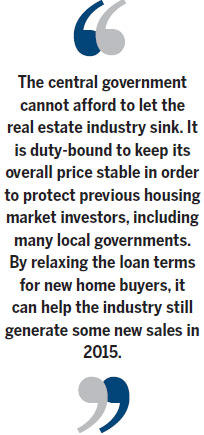Quibbling over GDP misses the point
Updated: 2014-11-21 12:27
By ED Zhang(China Daily Europe)
|
|||||||||||
China faces two key tasks: supporting the economy's bottom line while igniting a new engine of growth
At this moment, questions about the Chinese economy seem to boil down to how well it can hold a steady course of GDP growth in 2015. Some economists, mostly with stock market backgrounds, say it had better target 7.5 percent growth, the same as this year, so as to boost people's confidence in China.
Others say no need. Seven percent is enough. Aiming for a 7.5 percent growth already seems too tall an order this year. It could be achieved, but what for? There's no obvious pressure for creating more non-farm jobs. Bothering too much about the growth rate would be unnecessary and inevitably direct a lot of government attention and energy away from the more important business of reform.
There are basically these two camps of opinion, no matter what forecasts investment institutions may come up with from now to the early weeks of 2015.
Beijing could achieve either target, even the 7.5 percent if it tries hard enough. It's only a matter of how much money supply the central government allows.
But such a debate about China's growth rate only touches on the superficial level. On a deeper level, or if viewed structurally, China's sustainability of growth would require the country to do two things at one time - hold up the economy's bottom line while starting up its new engine.
The bottom line is the urban real estate industry.
The latest data show that new residential housing prices in the 70 largest cities fell 2.62 percent year on year in October, practically back to its level of a year ago.
Real estate is a large industry. In the first half of the year, according to the National Bureau of Statistics, real estate showed the least growth in all major industries. It obviously was a main contributor to China's overall slowdown.
Since 2009, a great deal of money, from both government offices and private investors, has been committed to housing development. Some of it ended up as a number of world-class ghost cities with hundreds of new units still to be filled by tenants. Even the more useful investments, represented by new railways and new airports, will take time to realize their full capacity.
The central government cannot afford to let the real estate industry sink. It is duty-bound to keep its overall price stable in order to protect previous housing market investors, including many local governments. By relaxing the loan terms for new home buyers, it can help the industry still generate some new sales in 2015.
But the industry can no longer serve as the economy's main powerhouse. The debt and low returns won't attract any more investors to housing development. Even if local governments were provided with the kind of easy credit they saw in 2009, they would probably no longer believe they could spend it on building new empty houses.
It is a relatively simple job to prevent the real estate market from fluctuating. Now comes the task of igniting a new engine.

Since there's still a long march to the opening up of the medical services and education markets, the only industry that seems to fit the role is e-commerce.
There are international data showing that China's online retail volume was over 1.8 trillion yuan ($300 billion) in 2013, exceeding for the first time that of the United States.
A somewhat inflated domestic report had that, in the first half of 2014, the country's total e-commerce generated 5.66 trillion yuan in total, an increase of more than 30 percent from last year.
Note that Alibaba, after it raised $25 billion from the US stock market in September, announced last week a forthcoming $8 billion corporate bond issuance. Its plan is yet to be known, yet its ambition is obvious.
Many privately run companies can do a lot in just one year. While by contrast, large State-owned enterprises only spend a lot of time, as they did this year, doing nothing in the way of reform, if not seeing their executives rounded up by anti-corruption officials.
The most exciting development could come from the mobile Internet, where companies have the least resistance to competition from the SOEs. Newly available 4G technology could induce more people, especially those in smaller cities and rural areas, to buy new handsets and launch new business applications.
The author is editor-at-large of China Daily. Contact the writer at edzhang@chinadaily.com.cn

(China Daily European Weekly 11/21/2014 page13)
Today's Top News
China wants its voice heard in cyberspace
New standards set for air purifiers
Alipay brings the frenzy of Black Friday to China
US violates China sovereignty in HK
Cyber terrorism sparks Internet debate
Editorial: Mob politics rocks HK
UnionPay offers discounts to outbound tourists
Palace Museum opens door to special groups for free
Hot Topics
Lunar probe , China growth forecasts, Emission rules get tougher, China seen through 'colored lens', International board,
Editor's Picks

|

|

|

|

|

|





